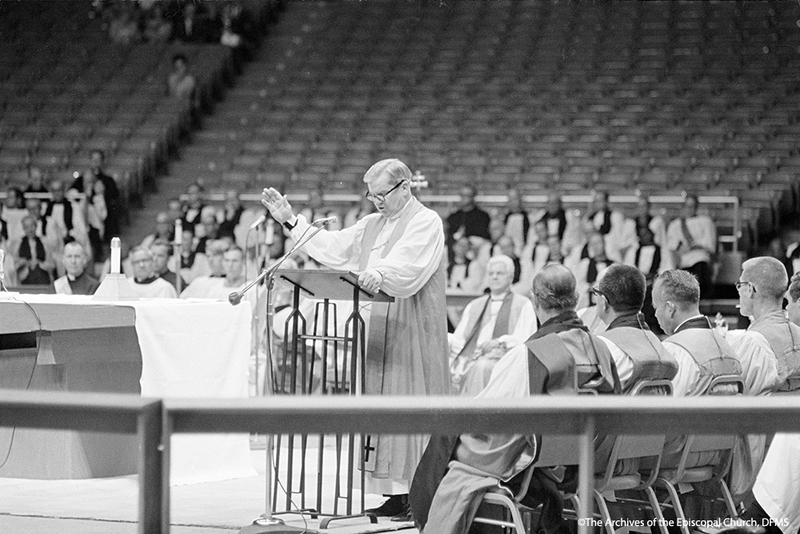John Hines, 1910-1997
Driven to Empower
Presiding Bishop John E. Hines speaking at the Special General Convention, 1969.
Bishop Hines considers the role and responsibilities of both clergy and lay ministry in the world, 1965.
Bishop Hines predicts the issues that will be the focus of the 1967 General Convention in Seattle.
Presiding Bishop Hines discusses the General Convention Special Program and the Church’s response to racial crisis, 1970.
Hines’ drive, commitment, and rare character were recognized by the House of Bishops in 1965 when they elected him as Presiding Bishop, a position he held until 1974. At a time of extreme turbulence within the country and the Episcopal Church, Hines guided the Church, labeling himself a “theological conservative and social progressive.” Taking an activist approach to social issues, Hines supported greater minority involvement in church councils and the ordination of women.
Above all, Hines positioned himself on the battlefront where Christian values converged with racism and poverty. This was profoundly evident in his response to the riots that broke out in dozens of American inner cities in 1967. Hines boldly proposed a reordering of the Church’s financial priorities in order to help address the deep inequalities in American society. He proposed empowerment and self-determination for African Americans by advocating for political and economic independence based on financial help free of conditions.
His vision resulted in the General Convention Special Program. Initially accepted by church members, it later became a source of dissension causing many congregations to withhold funds from the General Convention. In his aim to rid the Church of overt racism, Hines’ GCSP accomplished much in spite of the backlash and misgivings of the Episcopalian majority.
Hines demonstrated innovation once again when in 1971 at a General Motors shareholders’ meeting, he supported the movement to divest American corporations of interests in South Africa as a way of protesting the systematic racism of apartheid. The divestment movement was credited by former Archbishop Desmond Tutu of South Africa as fundamental in the eventual collapse of apartheid. In 1971, Hines was named “Clergyman of the Year” by the interfaith organization Religious Heritage of America.
Controversy and Deliverance
In spite of the controversy and criticism targeting Hines and affecting his decision for voluntary retirement before the end of his term, he did not abandon his commitment to the impoverished and oppressed. Debate detracts from the legacy of Hines’ term as Presiding Bishop. Although he forever changed the Church’s definition of domestic mission to social engagement, he is also considered the chief cause of the church’s shrinking population and loss of confidence in national Church structures. The personal toll was also profound.
Upon his retirement in 1974, he and his wife moved to North Carolina where they lived for almost 20 years. Rarely did he participate in national church affairs, preaching infrequently, lecturing occasionally, and participating in the consecration of bishops. In 1993, he and his wife, Helen, moved to Austin, Texas. Helen died in 1996, and he succeeded her in 1997. [Sources]


